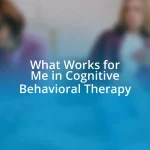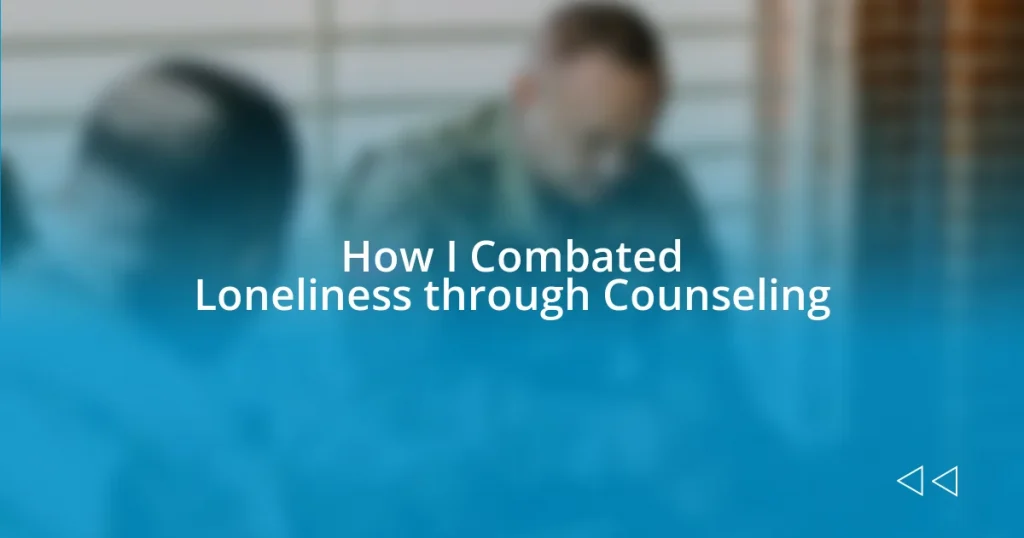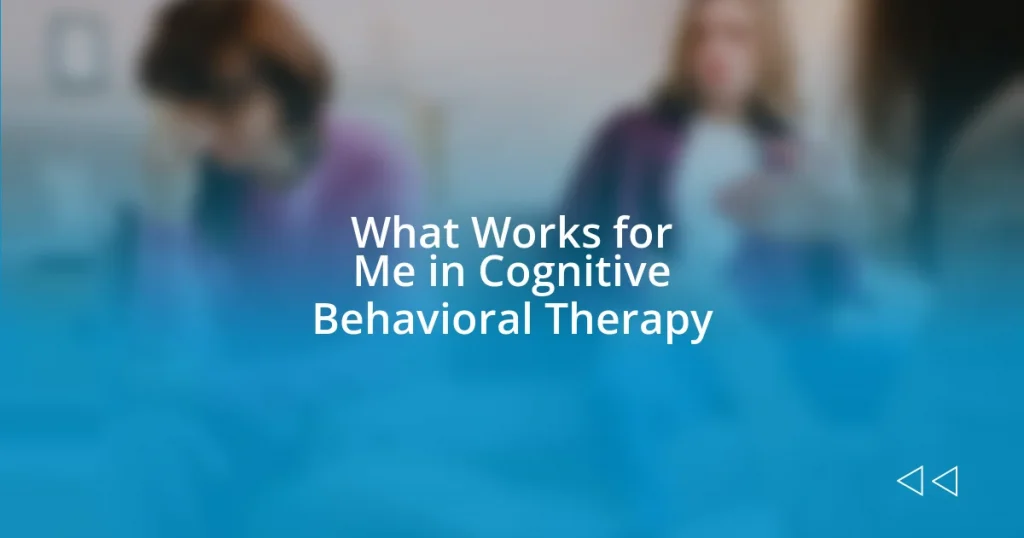Key takeaways:
- Loneliness arises from a lack of meaningful connections and can have both emotional and physical health consequences.
- Recognizing the need for support is a critical first step; vulnerability and seeking help can lead to healing and connection.
- Exploring various counseling options and setting flexible goals can enhance the therapeutic journey, allowing for personal growth and measurement of progress.
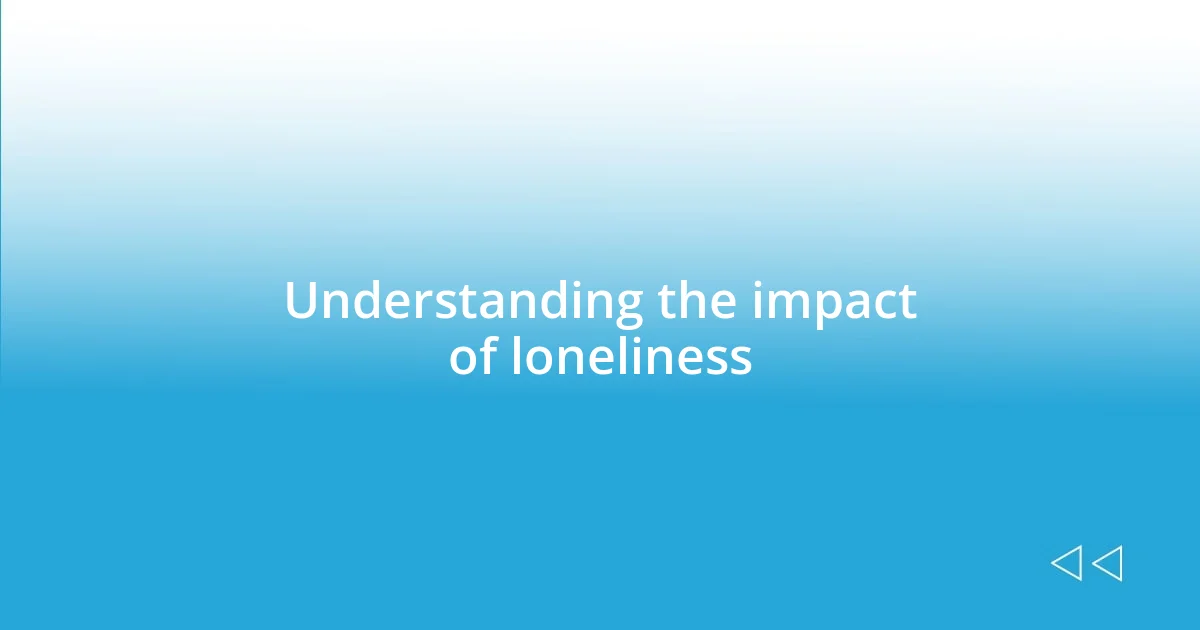
Understanding the impact of loneliness
Loneliness can be a heavy burden, often creeping in when we least expect it. I remember a time when I found myself surrounded by friends but still felt painfully alone. It made me question, how is it possible to feel isolated in a crowd? That’s the paradox of loneliness; it doesn’t just stem from physical isolation but rather from a lack of meaningful connections.
The impact of loneliness extends beyond emotional pain; it can affect our physical health as well. Research has shown that it can elevate stress levels and even weaken our immune system, leading to a range of health issues. I learned this firsthand when my struggle with loneliness transformed into constant fatigue, making it hard to enjoy activities I once loved. Isn’t it surprising how profound a feeling can be?
Moreover, the stigma surrounding loneliness often keeps us from reaching out. I recall hesitating to share my struggles with friends, fearing they wouldn’t understand. This silence can only deepen feelings of isolation, creating a cycle that’s hard to break. How do we begin to dismantle the barriers that prevent honest conversations about loneliness?
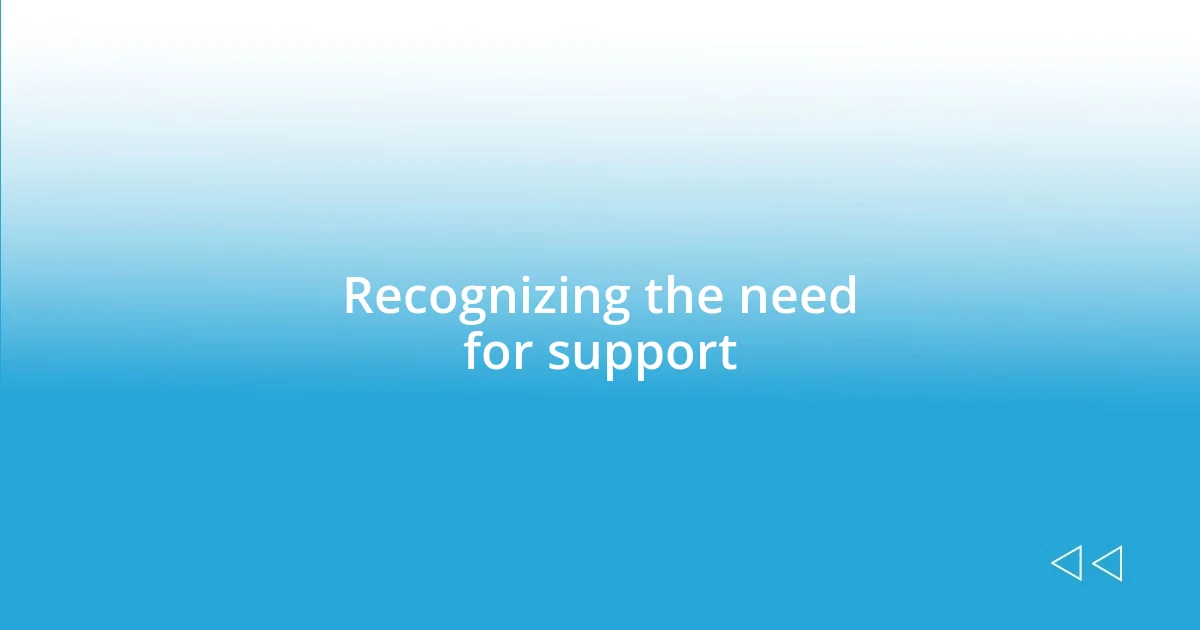
Recognizing the need for support
Recognizing the need for support can often feel like a daunting journey. For me, it started with an unsettling realization during a particularly low moment. I remember sitting in my apartment, the silence echoing around me while the weight of loneliness pressed heavily on my chest. I thought, “Isn’t it time I acknowledged how I truly feel?” That moment of clarity was the first step towards understanding that seeking help wasn’t a sign of weakness but rather a courageous decision to prioritize my well-being.
As I reflected further, I noticed some telltale signs that indicated I needed support. Feeling overwhelmed by daily tasks, constant fatigue, and finding little joy in activities I once loved became part of my routine. I vividly recall a day when even my favorite show lost its charm, leaving me with an unsettling void. At that moment, I understood that these feelings were indicators – a signal that reaching out could be my lifeline. Recognizing the need for support isn’t just about acknowledging loneliness; it’s about tuning into our emotional state and being open to the possibility of healing.
In my experience, the transformation begins when we allow ourselves to be vulnerable. I remember an insightful conversation with a friend who shared her own struggles. Hearing her story made me realize that I wasn’t alone in feeling this way. I started to question, “What if opening up could lighten my burden?” That thought inspired me to seek counseling, shifting my perspective from isolation to connection. Embracing the need for support made me realize that vulnerability fosters understanding and paves the way for recovery.
| Indicators of Needing Support | Your Feelings |
|---|---|
| Emotional Indicators | Suggested Actions |
| Constant fatigue | Take breaks and reflect on your emotional state. |
| Loss of interest in activities | Try to engage in conversations with others about how you feel. |
| Feeling overwhelmed | Write down your feelings and consider reaching out for help. |
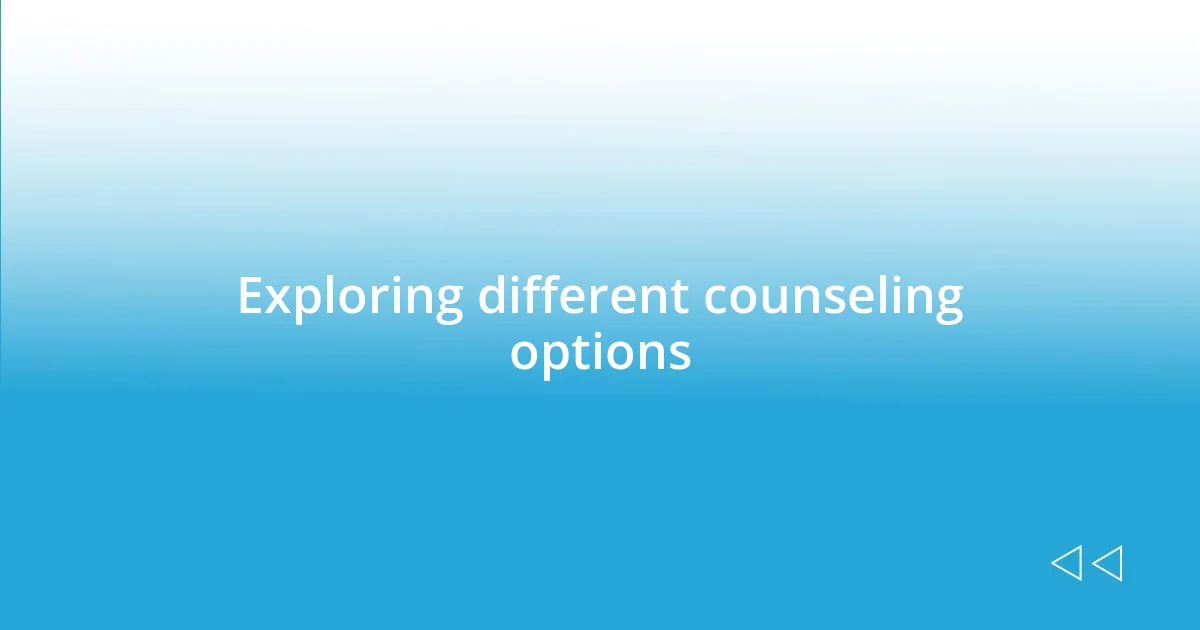
Exploring different counseling options
Exploring different counseling options has been transformative for me in combating loneliness. Initially, I felt overwhelmed by the variety of choices available—individual therapy, group sessions, and even online counseling. Each option seemed to have its unique benefits, but I was unsure which direction to take. I recall the moment I decided to try individual therapy. It wasn’t easy, but I was desperate for a safe space to explore my feelings. That one-on-one connection allowed me to dive deep into my emotions without judgment, and it was there that I first articulated the loneliness I had been carrying.
Here are some counseling options I’ve found helpful:
- Individual Therapy: Engaging with a therapist one-on-one provides a personalized approach to uncovering your emotions.
- Group Therapy: Connecting with others facing similar struggles fosters a sense of community and shared understanding.
- Online Counseling: Digital platforms offer flexibility and access to therapists from anywhere, which can be a game-changer for those with mobility or location challenges.
- Support Groups: Gathering with individuals who’ve experienced loneliness creates a support network, reinforcing that you’re not alone in your feelings.
- Workshops and Retreats: Participating in guided experiences focused on emotional well-being allows for introspection and may introduce you to new coping strategies.
As I navigated these options, I began to appreciate the different avenues available. Each choice presented a unique opportunity for reflection and growth. For instance, in group therapy, I felt an unexpected connection with others who understood my struggles. Their stories sparked a sense of empathy within me, allowing me to see my own journey from a new perspective. That communal experience was invaluable, reminding me how powerful shared vulnerability can be in diminishing feelings of isolation.
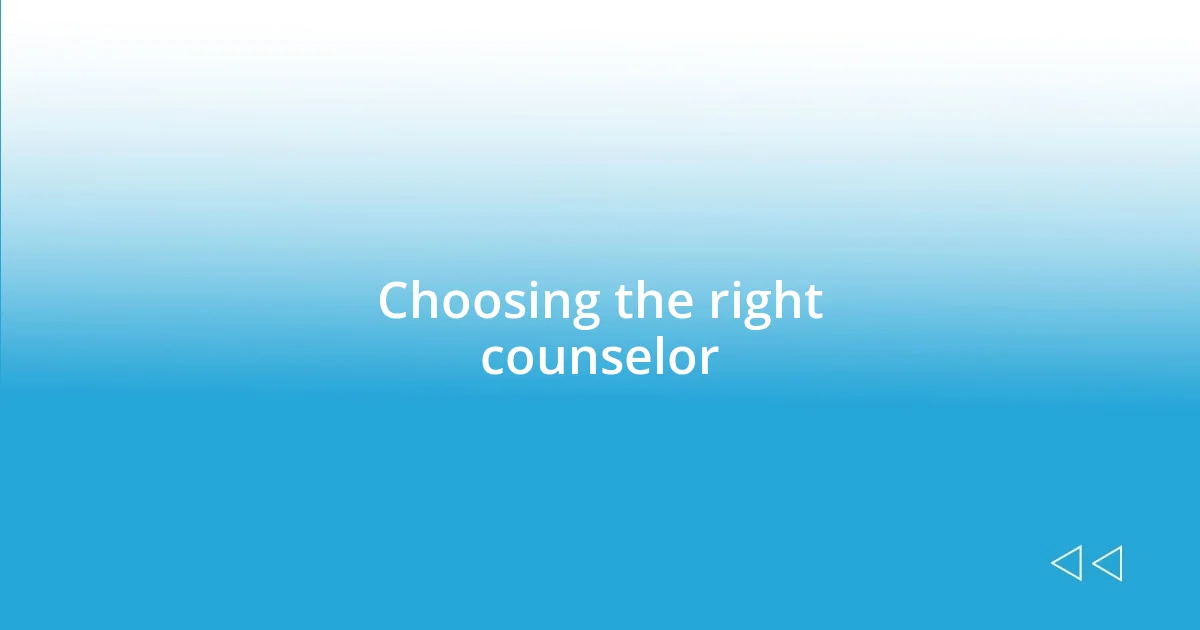
Choosing the right counselor
Choosing the right counselor is crucial in the journey of healing. I remember sifting through countless profiles online, each promising but many feeling generic. I asked myself, “What do I really need from a counselor?” This introspection led me to prioritize finding someone who genuinely resonated with my concerns and experiences. After all, a connection with your counselor can significantly enhance trust, allowing for deeper, more impactful conversations.
It’s essential to consider not just qualifications, but also personal style and approach. I once had an initial session with a counselor who specialized in cognitive behavior therapy (CBT) – a method focused on changing negative thought patterns. While the techniques were valuable, I realized that I needed a more empathetic approach. I didn’t want to just analyze my feelings; I longed for emotional support and understanding. That’s when I switched to a counselor whose style felt like a warm invitation, helping me feel safe to explore my innermost thoughts.
I also learned the importance of compatibility in this process. After a few sessions, I asked myself, “Does this person make me feel heard?” When I felt a comforting presence and the freedom to be vulnerable, it became easier to share my experiences. Ultimately, trust can take time to build, but finding the right counselor can act as a powerful catalyst for healing. It’s worth taking the time to assess which professional can truly guide you through your journey.
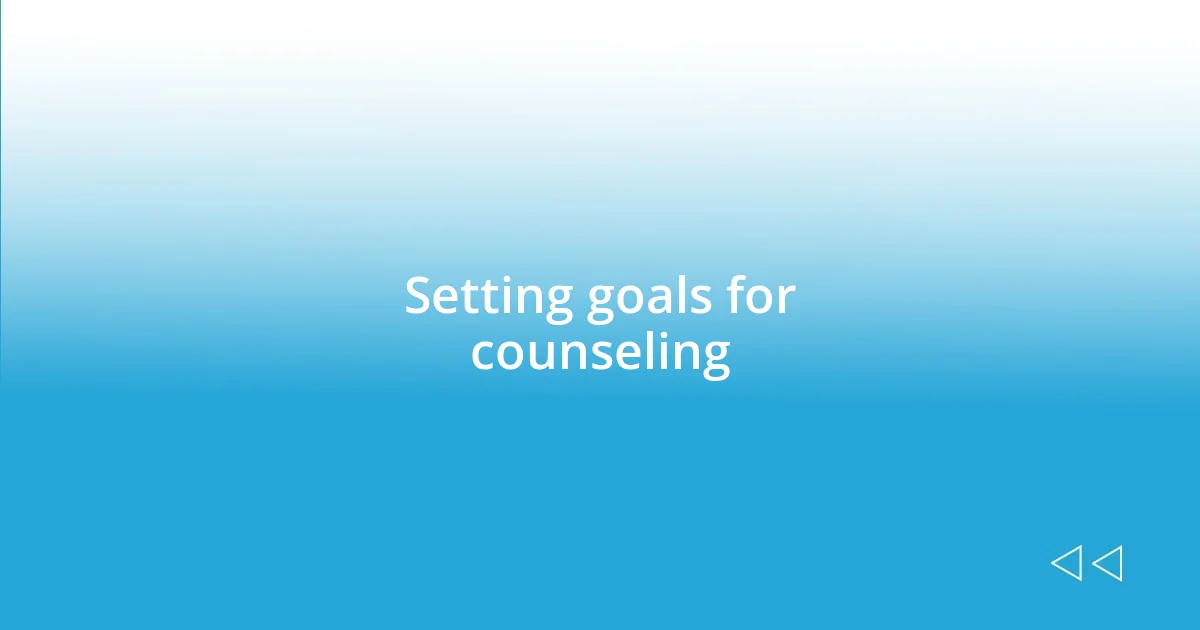
Setting goals for counseling
Setting goals for counseling is a fundamental step in navigating the therapeutic journey. When I began my sessions, one of the first questions my therapist posed was, “What do you hope to achieve from our time together?” I found myself pausing, realizing I hadn’t given it much thought. Setting clear, achievable goals not only provides direction but also allows for evaluation of progress along the way.
In my case, one of my primary goals was to develop healthier coping strategies for managing my loneliness. I vividly remember journaling my thoughts after our initial meetings, listing what I wanted to focus on. This simple practice made me feel empowered. Instead of feeling lost in my emotions, I had tangible objectives like improving my social skills and building meaningful connections. These goals acted like a roadmap, guiding our discussions and helping me stay engaged in the process.
As we progressed, I also learned the importance of being flexible with my goals. There were moments when I realized my priorities shifted—what seemed crucial in the beginning faded as new issues surfaced. I often reminded myself that counseling is not a linear path; it’s more of a winding journey. This realization allowed me to adapt, embracing the changes rather than clinging to an initial plan. Have you ever experienced similar shifts in your own goals? Embracing that fluidity helped me uncover deeper layers of my loneliness and find greater clarity in my healing process.
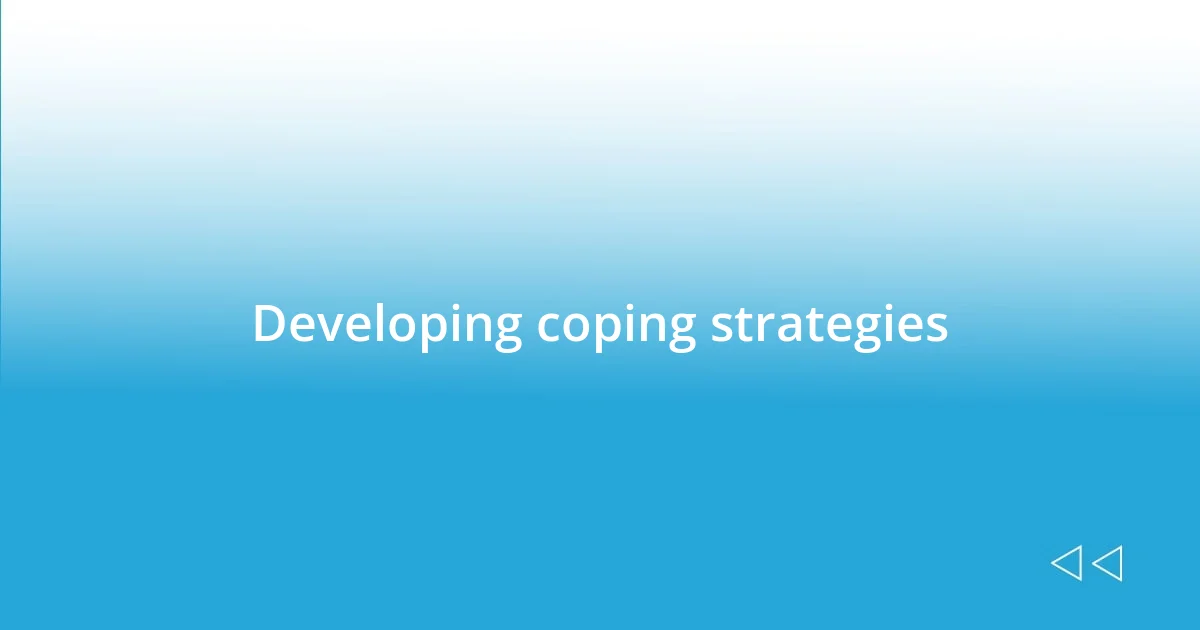
Developing coping strategies
Developing coping strategies became a vital part of my therapy journey. One pivotal moment was when my counselor introduced me to mindfulness techniques. Initially, I was skeptical; how could simply focusing on my breath ease my loneliness? But as I practiced, I noticed a shift – my racing thoughts slowed, allowing me to feel more present. I learned that acknowledging my feelings, rather than pushing them away, was a powerful way to cope.
Another technique that resonated with me was the practice of setting small, achievable tasks each week. I remember one week focusing on reaching out to a friend and just having a casual chat, something I’d previously avoided. I was surprised by how welcoming this small interaction felt. It opened the door to new connections and reminded me that vulnerability can lead to unexpected support. Have you ever felt that simple actions could make a big difference?
Looking back, I understand that coping strategies are both personal and flexible. While some techniques worked wonders for me, others fell flat. For instance, I tried group activities initially, hoping to alleviate my loneliness, but felt overwhelmed instead. This experience taught me that not every strategy is a one-size-fits-all solution. It’s crucial to explore different approaches, adjusting as needed until you find what truly resonates. Trusting that process helped me discover not only coping strategies but also more about myself.
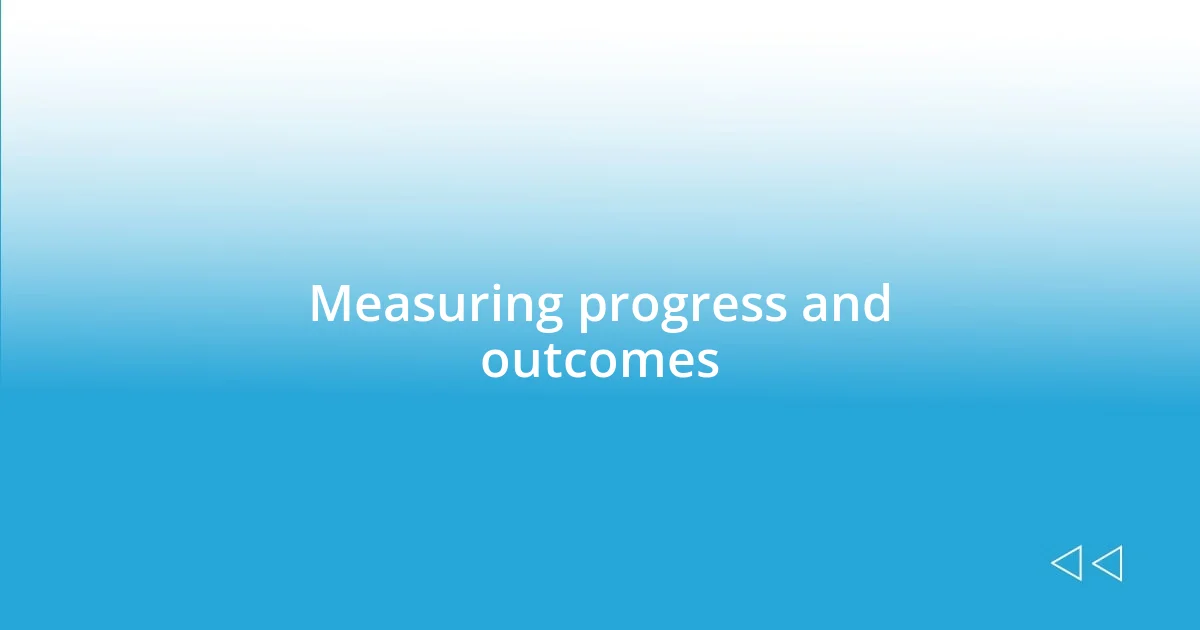
Measuring progress and outcomes
Measuring my progress in counseling often felt like piecing together a puzzle. Each session brought new insights, and I began to track my emotions more closely. One effective method I used was maintaining a mood journal—a simple tool that helped me connect my feelings with particular situations or thoughts. It was surprisingly revealing. Have you ever noticed how some days feel heavier than others, even without an obvious reason? That journal helped me make sense of those fluctuations.
I also found it beneficial to share my observations with my therapist. Each time I articulated a positive shift, whether it was feeling a tiny spark of joy or having a meaningful conversation, it reinforced my growth. One week, I recognized I was smiling more during the day. That realization was both exhilarating and a little bittersweet, as it highlighted just how far I had come from feeling profoundly alone. For me, acknowledging those milestones was critical—without them, I might have dismissed my progress as insignificant.
As I continued my journey, measuring outcomes became less about counting wins and more about feeling shifts in my heart and mind. In one session, I shared a story about a time I reached out to someone I hadn’t spoken to in years. Not only did I reconnect, but I also felt a sense of belonging that had been missing for a long while. This kind of reflection helped me see how far I’d traveled, reminding me of the depth of my resilience. Isn’t it incredible how small moments can lead to monumental changes?


